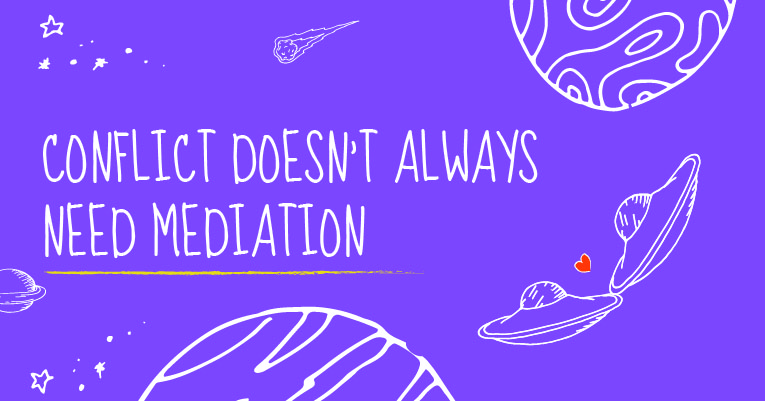In this blog, Tim discusses how a conflict doesn’t always need mediation.

By Tim Frear
The employment relationship can be fragile and as we’re spending so much of our lives at work, when this relationship starts to break down, mediation is a great way to resolve issues and disputes.
Advisory, Conciliation and Arbitration Service (ACAS) states: ‘Mediation works best in resolving relationship issues between people rather than matters of fact’.
Which poses the question: is there an alternative to mediation?
We always consider conflict to be negative, however in reality it’s important to have a good degree of conflict in the professional workplace, as this creates alternate thinking, creativity and creating new ways of doing things to get better, and more productive results for the organisation as a whole. Conflict is always going to be difficult and managing it appropriately can be a challenging task. So the key to effective management of conflict starts with effective communication.
As an authentic leader your communication is key, how you set expectations for conflict to be handled will inevitably be the standards to which your team work by. You should be modelling the behaviours you are looking for, reward people when they do well, and coach them when they fall short.
Everyone is required to communicate with each other, so clearly defined professional behaviour should be provided. Where this is breached, leaders should take ownership of the situation and steer this back on track. Expectations of professional conflict should not bleed over into personal insults as this can permanently damage the employment relationship.
How can we balance positive conflict to that which becomes negative?
There will always be times when professional conflict will become negative, we’re all human and in a working scenario it’s inevitable. As a leader you should be able to identify this in the initial stages, don’t be afraid to intervene and offer support or assistance. At times a simple conversation is all that’s needed to get the conversations back on track.
It’s important to understand when someone loses faith or has a damaged lack of trust in a process or person. As a leader you should know your employees well enough to intercept conflict and turn the situation around.
Promoting effective listening, and the understanding the views of others will encourage conflict to resolve itself without intervention, creating a culture where conflict is calmly discussed. When you set expectations make sure everyone has a voice, and that it’s fun and open.
At times, we’re all guilty of hiding behind a computer or telephone. Encourage your teams to move away from the monitors and have a face to face discussion, this will inevitably resolve issues quicker and more effectively than email tennis!
Finally, if you’re creating a team for a project, it’s important to create the right team that will have effective conflict. There are many ways of creating an effective team, but in my experience one of the best ways is to use psychometrics. I have been using Corn Ferry Hay Group, Talent Q psychometric testing, which gives you a clear view of the employee and what they can bring to the table. By doing this, you reduce the possible conflict arising from too many similar team types.
If you have conflict issues, need guidance on creating a culture of effective communication, or would like to create an effective team using psychometrics, just get in touch!
Leeds based HR180 is a team of superheroes in HR Outsourcing, Projects and Consultancy committed to work in partnership with organisations of all sizes to establish working policies to go above and beyond Employment Law requirements, to protect both employees and employers alike. We love to hear from you, so call us on 0113 287 8150 or hit the Rescue Me button.
You can filter through our news using the tags below, just select one and off you go!


We’ll fly to your aid for any HR reason (and some non HR ones!)
